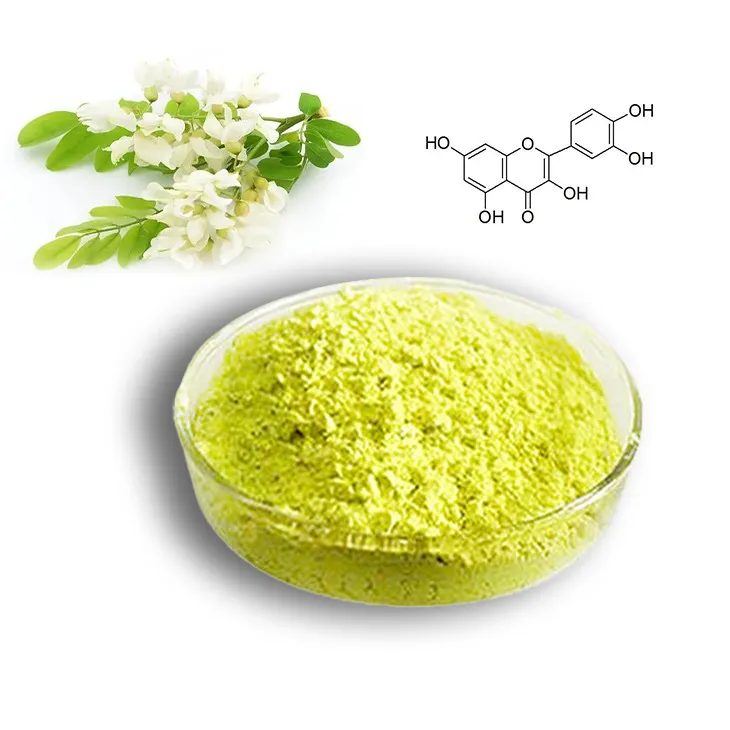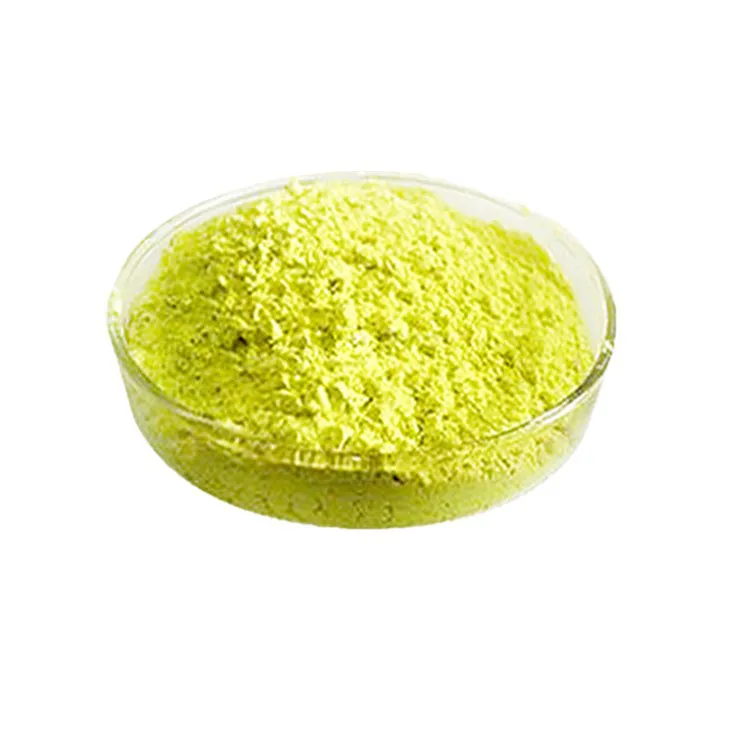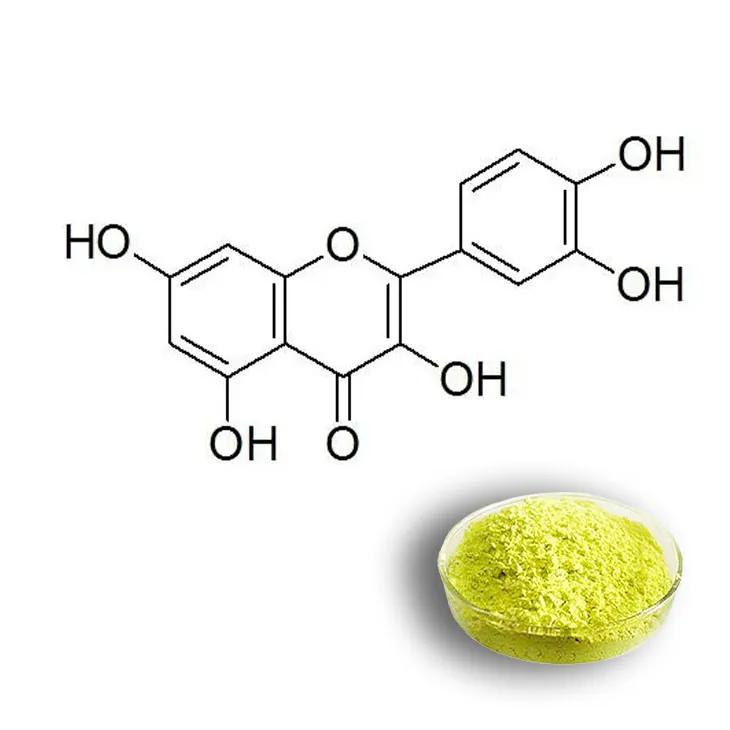- 0086-571-85302990
- sales@greenskybio.com
Quercetin's Role in Health: Unveiling Its Benefits for the Body
2024-07-31

1. Introduction to Quercetin
Quercetin is a flavonoid that is widely distributed in nature. It can be found abundantly in a variety of fruits, vegetables, and herbs. This natural compound has been the focus of much research in recent years due to its potential health - enhancing properties. Some of the common sources of Quercetin include apples, onions, berries, and green tea. The presence of quercetin in these dietary sources makes it an easily accessible component for promoting health through diet.

2. Antioxidant Properties of Quercetin
2.1. Understanding Free Radicals
Free radicals are highly reactive molecules that are produced in the body during normal metabolic processes as well as in response to environmental factors such as pollution, radiation, and smoking. These free radicals have unpaired electrons, which makes them extremely unstable and eager to react with other molecules in the body. When they react with cellular components such as DNA, proteins, and lipids, they can cause damage, leading to cellular degeneration and various diseases.
2.2. How Quercetin Neutralizes Free Radicals
Quercetin acts as a powerful antioxidant. It has the ability to donate electrons to free radicals, thereby neutralizing their reactivity. This process helps to prevent the free radicals from causing damage to the body's cells. By scavenging free radicals, quercetin can play a significant role in maintaining the integrity of cellular structures and functions. For example, it can protect the cell membranes from lipid peroxidation, which is a process that can disrupt the normal function of the cell membrane and lead to cell death.
3. Anti - Inflammatory Effects of Quercetin
3.1. The Inflammatory Response in the Body
Inflammation is a natural defense mechanism of the body in response to injury, infection, or irritation. However, chronic inflammation can be harmful and is associated with many diseases, including arthritis, heart disease, and certain cancers. The inflammatory response involves the activation of immune cells, the release of inflammatory mediators such as cytokines and prostaglandins, and an increase in blood flow to the affected area.
3.2. Quercetin's Role in Soothing Inflammation
Quercetin has been shown to have anti - inflammatory properties. It can inhibit the production of inflammatory mediators. For instance, it can suppress the synthesis of cytokines such as interleukin - 6 (IL - 6) and tumor necrosis factor - alpha (TNF - α). By reducing the levels of these pro - inflammatory cytokines, quercetin can help to soothe the body's inflammatory responses. Additionally, quercetin can also inhibit the activity of enzymes involved in the production of prostaglandins, which are important mediators of inflammation.
4. Benefits for Cardiovascular Health
4.1. Cardiovascular Diseases and Their Risk Factors
Cardiovascular diseases are a major cause of death worldwide. Risk factors for these diseases include high blood pressure, high cholesterol levels, obesity, and diabetes. These risk factors can lead to the development of atherosclerosis, which is the build - up of plaque in the arteries. Atherosclerosis can narrow the arteries and restrict blood flow, increasing the risk of heart attacks and strokes.
4.2. How Quercetin Reduces Cardiovascular Risks
Quercetin can have a positive impact on cardiovascular health in several ways. First, it can help to lower blood pressure. It does this by relaxing the blood vessels, which allows for easier blood flow. Second, quercetin can reduce cholesterol levels. It can inhibit the absorption of cholesterol in the intestines and also promote the breakdown of cholesterol in the liver. Third, quercetin has anti - inflammatory and antioxidant properties, which can protect the blood vessels from damage caused by inflammation and free radicals. This helps to prevent the development of atherosclerosis and reduces the risk of heart - related problems.
5. Influence on the Immune System
5.1. The Immune System and Its Function
The immune system is a complex network of cells, tissues, and organs that defends the body against foreign invaders such as bacteria, viruses, and parasites. It has both innate and adaptive components. The innate immune system provides immediate, non - specific defense, while the adaptive immune system mounts a more specific response based on the recognition of specific antigens.
5.2. Quercetin's Modulation of the Immune System
Quercetin can modulate the immune system. It can enhance the function of immune cells such as macrophages and natural killer cells. Macrophages are important for engulfing and destroying foreign pathogens, while natural killer cells can kill virus - infected cells and tumor cells. Quercetin can also regulate the production of cytokines, which are important for communication between immune cells. By modulating the immune system, quercetin may help the body to better defend against infections and diseases.6. Implications for Cancer Prevention
6.1. Cancer Development and Its Complexity
Cancer is a complex disease that results from the uncontrolled growth and spread of abnormal cells. There are many factors that contribute to cancer development, including genetic mutations, environmental factors, and lifestyle factors such as smoking, diet, and lack of exercise. The process of cancer development involves multiple steps, including initiation, promotion, and progression.
6.2. Quercetin's Potential Role in Cancer Prevention
Quercetin has shown potential in cancer prevention. Its antioxidant and anti - inflammatory properties may play a role in preventing the initial genetic mutations that can lead to cancer. Additionally, quercetin can induce apoptosis (programmed cell death) in cancer cells. It can also inhibit the growth and spread of cancer cells by interfering with various signaling pathways involved in cancer cell proliferation and metastasis. However, more research is needed to fully understand the mechanisms by which quercetin may prevent cancer and to determine its effectiveness in different types of cancer.7. Conclusion
Quercetin is a remarkable compound with a wide range of potential health benefits. Its antioxidant, anti - inflammatory, cardiovascular - protective, immune - modulating, and potential cancer - preventive properties make it a valuable addition to a healthy diet. However, it is important to note that while quercetin shows great promise, more research is still needed to fully understand its mechanisms of action and to determine the optimal dosage for different health conditions. Incorporating foods rich in quercetin into our diet is a simple and natural way to potentially improve our health, but we should also consult with healthcare professionals when considering using quercetin supplements.
FAQ:
What are the main sources of quercetin?
Quercetin is found abundantly in various fruits, vegetables, and herbs. Some common sources include apples, onions, berries (such as blueberries and strawberries), citrus fruits, broccoli, and green tea.
How does quercetin act as an antioxidant?
Quercetin acts as an antioxidant by neutralizing harmful free radicals. Free radicals are unstable molecules that can cause damage to cells through a process called oxidative stress. Quercetin donates electrons to these free radicals, thereby stabilizing them and preventing them from causing cellular degeneration.
Can you explain how quercetin reduces inflammation?
Quercetin has anti - inflammatory properties. It can interfere with the production of inflammatory mediators in the body. These mediators are substances that are involved in the body's inflammatory responses. By reducing their production, quercetin can soothe the body's inflammatory responses, which is beneficial for various health conditions.
What is the connection between quercetin and cardiovascular health?
Quercetin has a beneficial influence on cardiovascular health. It may help reduce the risk of heart - related problems. It can do this by several mechanisms, such as reducing oxidative stress in the blood vessels, improving endothelial function (the inner lining of blood vessels), and reducing inflammation, all of which are factors associated with heart disease.
How might quercetin play a role in cancer prevention?
Quercetin may play a role in cancer prevention through its effects on the immune system and its antioxidant and anti - inflammatory properties. It may help the body's immune system to better detect and eliminate cancer cells. Also, by reducing oxidative stress and inflammation, which are associated with the development of cancer, it may potentially lower the risk of cancer development.
Related literature
- Quercetin: A Promising Molecule for Health Benefits"
- "The Role of Quercetin in Preventive Health"
- "Quercetin and Human Health: An Overview"
- ▶ Hesperidin
- ▶ Citrus Bioflavonoids
- ▶ Plant Extract
- ▶ lycopene
- ▶ Diosmin
- ▶ Grape seed extract
- ▶ Sea buckthorn Juice Powder
- ▶ Fruit Juice Powder
- ▶ Hops Extract
- ▶ Artichoke Extract
- ▶ Mushroom extract
- ▶ Astaxanthin
- ▶ Green Tea Extract
- ▶ Curcumin
- ▶ Horse Chestnut Extract
- ▶ Other Product
- ▶ Boswellia Serrata Extract
- ▶ Resveratrol
- ▶ Marigold Extract
- ▶ Grape Leaf Extract
- ▶ New Product
- ▶ Aminolevulinic acid
- ▶ Cranberry Extract
- ▶ Red Yeast Rice
- ▶ Red Wine Extract
-
Giant Knotweed Extract
2024-07-31
-
Wheat Germ Extract
2024-07-31
-
Grapefruit Seed Extract Powder
2024-07-31
-
Coconut Water Powder
2024-07-31
-
Tinospora cordifolia extract
2024-07-31
-
Bayberry Extract
2024-07-31
-
Maca Extract
2024-07-31
-
Aguaje Extract
2024-07-31
-
Golden Seal Extract
2024-07-31
-
White Peony Extract
2024-07-31





















